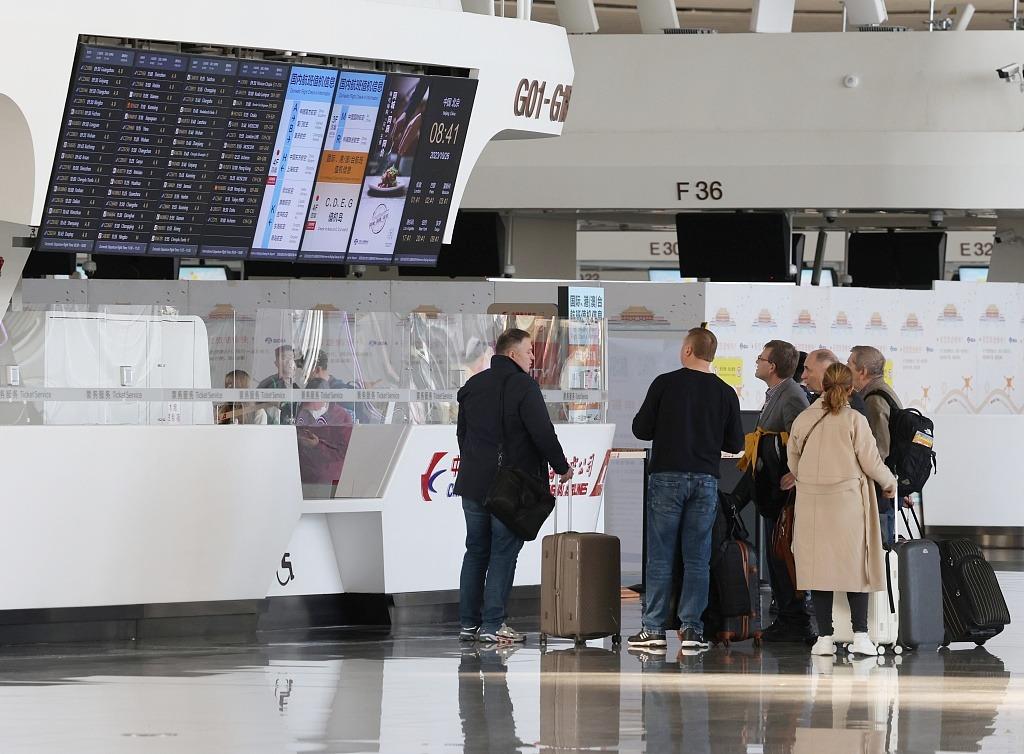 This undated file photo shows foreigners at Beijing Daxing International Airport. (PHOTO / CHINA DAILY)
This undated file photo shows foreigners at Beijing Daxing International Airport. (PHOTO / CHINA DAILY)
People from the United States who travel to China have expressed satisfaction with the country's newly streamlined visa policies.
Beijing has made it easier for US residents to travel to China by no longer requiring certain documents for a visa application as of Jan 1.
"I was happy when I saw the announcement that they would no longer require proof of round-trip airfare, hotel bookings and itinerary for tourist visas," a tourist who asked to be identified only as George told China Daily.
George applied for a tourist visa at the Chinese Consulate General in Los Angeles earlier this year. He went to the consulate on a Monday morning. "I didn't have to make an appointment; I just walked in," he said.
He was roughly 15th in line, and his name was called about an hour and a half later.
"After I went up to the window, it was done in about five minutes. I wasn't asked for any of the paperwork, and I was told to come back in four days to pick up my visa. The whole process was smooth sailing."
George, a computer engineer, said he plans to travel to China in March for about two weeks.
"I appreciate the new visa policy because it provides me with flexibility. I have only booked hotels for the first week. I do have a plan, but who knows, I might want to visit a place I haven't thought about while there. It's nice to be able to be spontaneous."
Chinese Ambassador to the US Xie Feng announced the streamlined visa process at a forum earlier this month in Atlanta, Georgia.
"Tourist visa applicants within the United States will no longer be required to submit round-trip air ticket booking record, proof of hotel reservation, itinerary or invitation letter," Xie said at a forum celebrating the 45th anniversary of the establishment of diplomatic relations between the two countries.
Xie said it is important to remove obstacles and spark a new boom in exchanges.
"Due to the COVID-19 pandemic and worsening China-US relations, a chill loomed over people-to-people exchanges in the past few years," he said. "When travel went down, estrangement and misunderstanding went up."
Elizabeth Hin, president of The White Rose Foundation, a nonprofit that promotes understanding and harmony among the world's religions, said the change represents the deepest value in US-China relations, which is "trust and reciprocity of trust".
Hin, who attended the Atlanta forum, said she first visited China in 1978, when the country began to open up, and has gone back and forth since. "It's not that difficult to do the application and have an invitation letter," she said. "But there is a welcoming sense (in forgoing such a requirement)."
Blaine Glass, director of The White Rose Foundation, said the discussion at the forum stirred his desire to visit China again, and the easier visa application is certainly welcome. The last time he visited China was more than 20 years ago, when he toured the Xizang autonomous region. "I wanted to learn tai chi," Glass said.
As China moves to improve people-to-people contact between the two countries, Xie, the ambassador to the US, said that Beijing hopes "the US side will work with China in the same direction by taking measures to clear obstacles in travel, visa and border-entry policies, further increase direct flights significantly, and adjust the China travel advisory as soon as possible".
Jing Quan, minister of the Chinese embassy in the US, told China Daily that due to a shortage of wide-body planes among US airlines, it has been difficult to increase the number of direct flights between China and the US.
In China, the wait time for a US visa application interview is about six months. "It's just impossible to arrange your itinerary with such a long wait," Jing said.
Dennis Wilder, a senior fellow for the Initiative for US-China Dialogue on Global Issues at Georgetown University, agreed that the long wait period for a US visa interview is a big problem.
"The problem is we need more American officers to do the interviews, and we don't have enough State Department people," Wilder said. "It is not easy to solve, because for Congress, it's not a priority."


